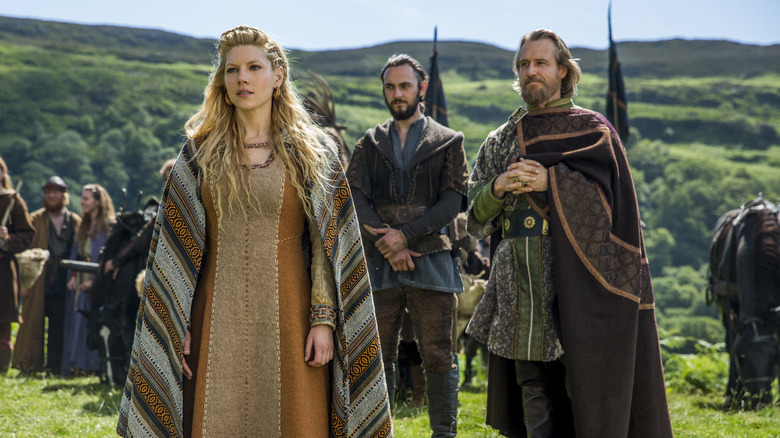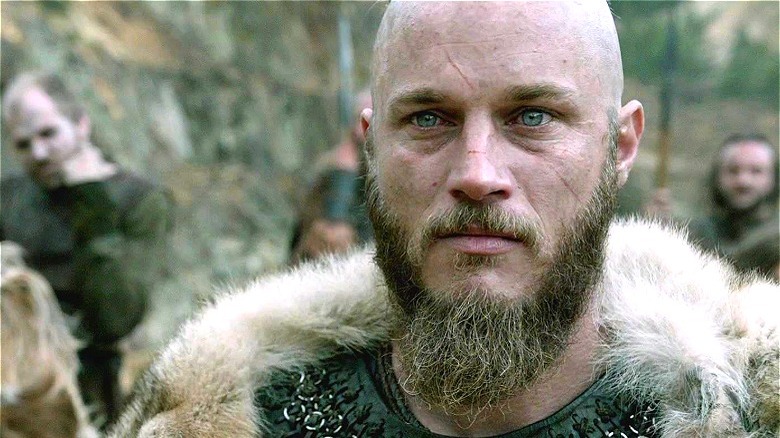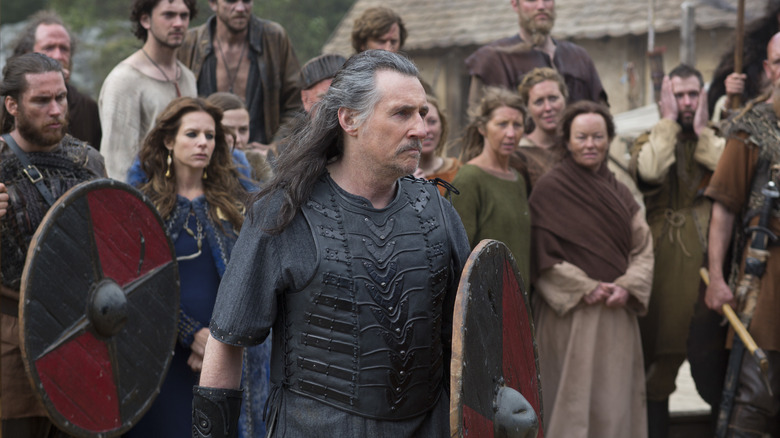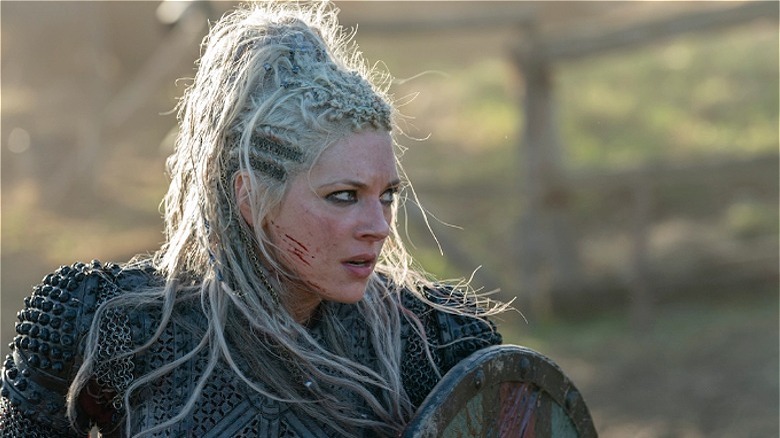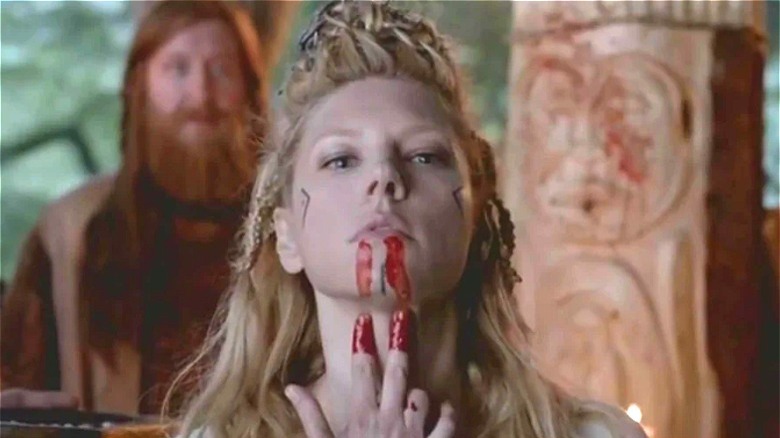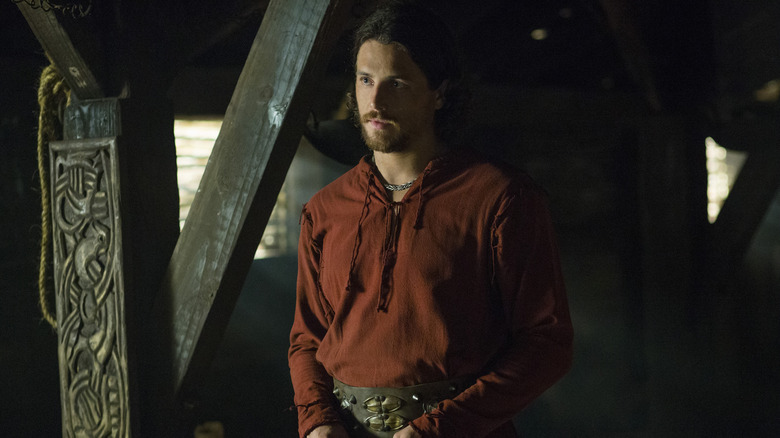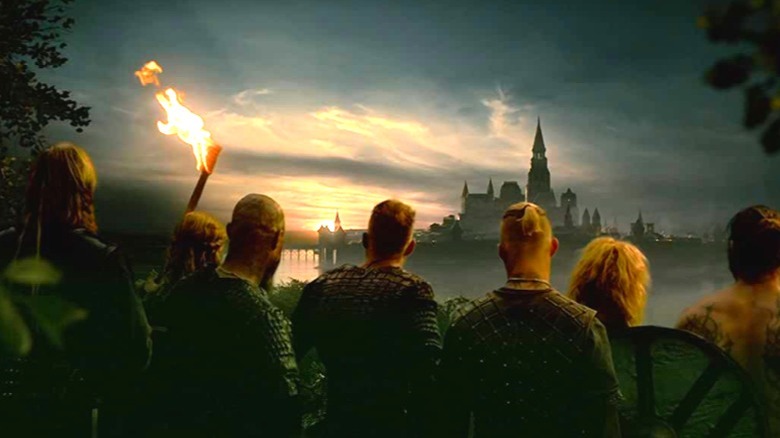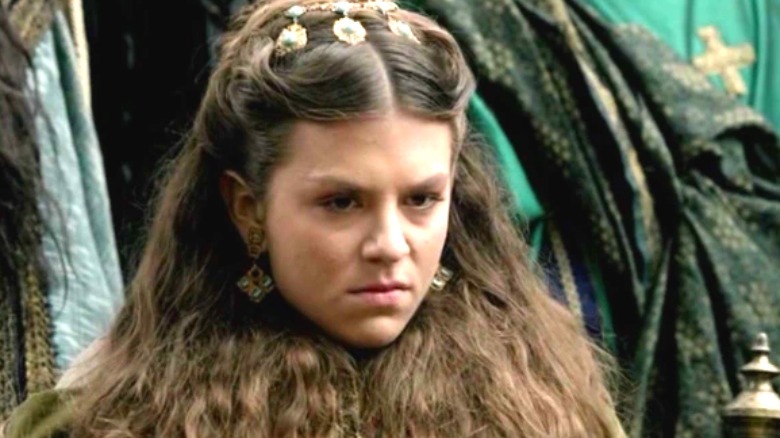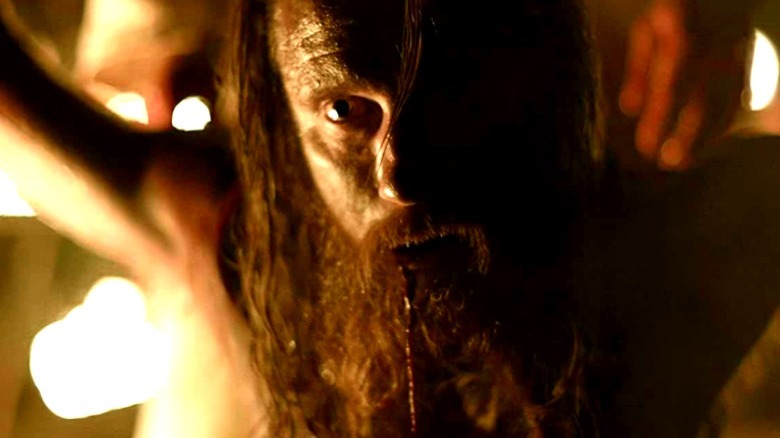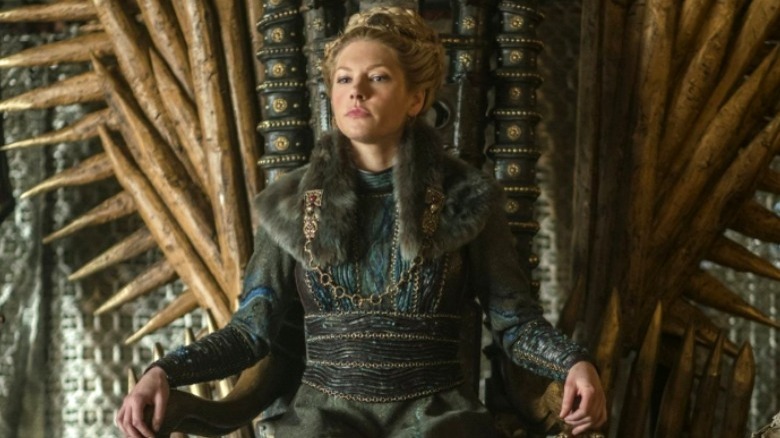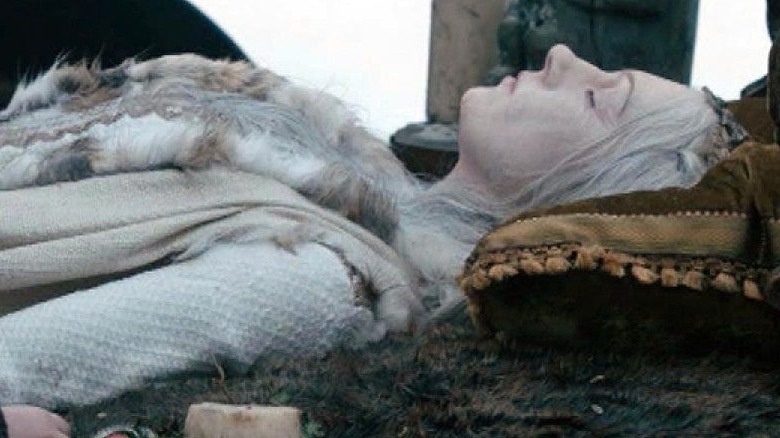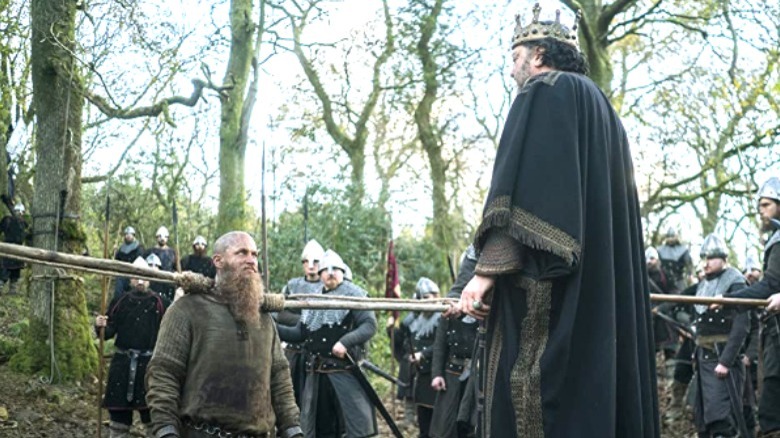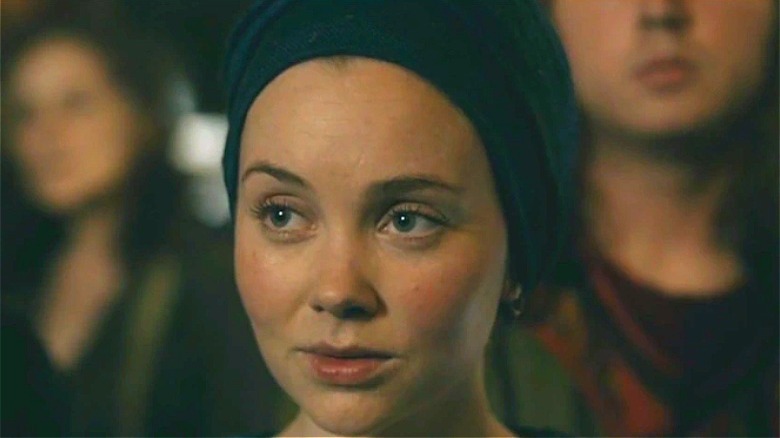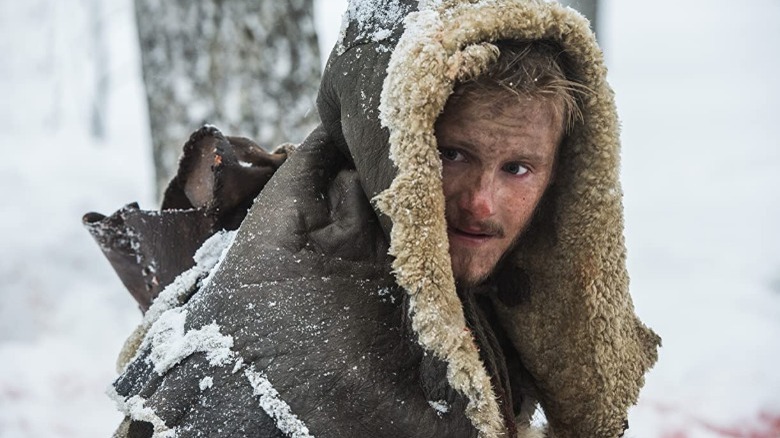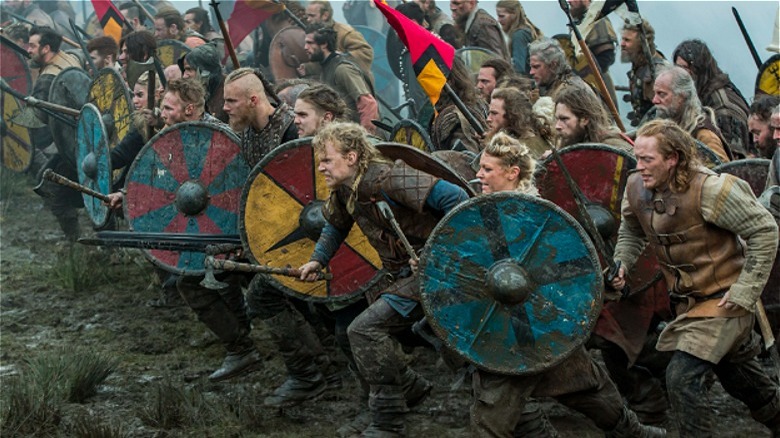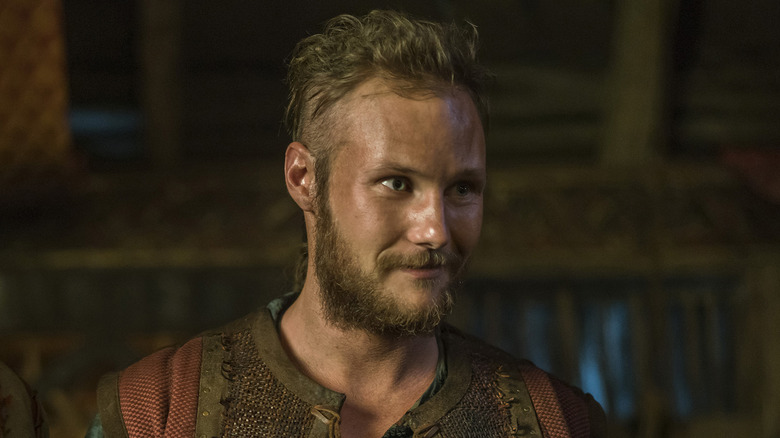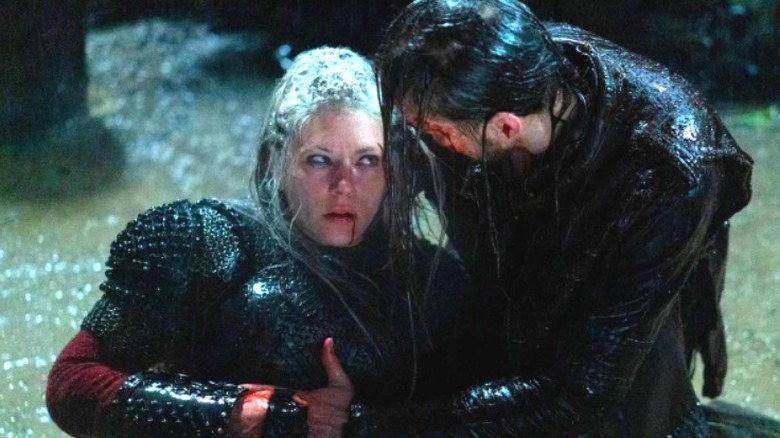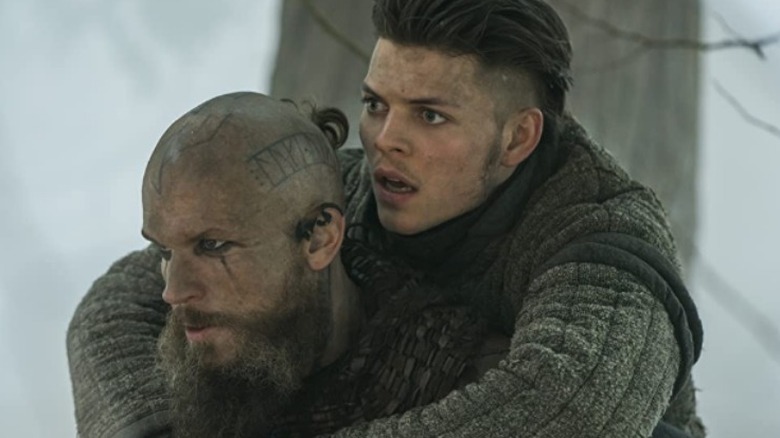Every Seer Prophecy In Vikings Explained
More than a thousand years after the Viking era began, History's "Vikings" series brought the tale of Ragnar Lothbrok and his sons to life in vibrant, violent glory. Recounting Ragnar's legendary ascension from farmer to raider to king, "Vikings" follows the raids that would forever change the course of Western Europe.
More fantasy than historical drama, the series is less concerned with factual accuracy than with recounting the spirit of the Nordic sagas, in which gods and legends were central. When the supernatural is serious business, spiritual leaders, healers, and oracles hold an important place in society, and none are more revered in Kattegat than the Seer. A seemingly ancient being with a connection to the divine, the Seer provides cryptic insights from the gods relayed through eerie, hallucinogenic visions.
As the Seer notes, "humankind cannot bear too much reality," so many of his prophecies cannot be accurately understood until after they've come to pass. Of course, that doesn't stop the Lothbroks from asking. Now that the "Vikings" journey is over, step into the longboat while we sort through the serpents and signs of every Seer prophecy.
As long as men have tongues to speak
Early in Ragnar's raiding career, the Seer issues a series of prophecies about his sons. After a particularly troubling argument with Aslaug, who accuses him of treating her poorly and prophesies their next son will be born with the image of a serpent in his eye, Ragnar decides to check in on his kids' futures. He asks the Seer, "What will become of them?" The Seer replies, "The sons of Ragnar Lothbrok will be spoken of as long as men have tongues to speak," before going on make several more specific predictions. The prophecy of Ragnar's lasting notoriety is one of the oracle's more straightforward predictions, and it's firmly grounded in the Viking's real-world legend.
Although scholars may quibble over exactly how much truth lies behind the legendary figure, there's no denying the exploits of Ragnar Lothbrok and his sons are still famous today. Ragnar's sons prove just as formidable as their father in the show, and they're also remembered today in their own Norse sagas. This level of renown is touched on in the "Vikings" sequel series "Vikings: Valhalla," as the Norsemen of England, Norway, and Greenland speak of Ragnar, Lagertha, and Ragnar's sons with an almost sacred reverence.
He searches for your death
Whether or not foreknowledge of one's fate can help it be sidestepped remains debatable. But either way, the characters in "Vikings" continue to try. As Earl Haraldson learns when he visits the wise one, the Seer isn't one to sugarcoat his prophecies –- and sometimes, they're downright grim.
While Ragnar turns out to be a good earner for Haraldson, his renown among the Vikings makes him a perceived threat. The earl finally has an excuse to take him down when Ragnar reveals that he killed Haraldson's half-brother and agent Knut on a trip to England. Haraldson has him imprisoned and put on trial, claiming that Ragnar is "an ambitious man" who "does not believe in our laws." But the case falls apart after Lagertha admits she killed Knut in self-defense — a story that's backed up by her brother-in-law, Rollo ("Trial").
His earthly efforts thwarted, Haraldson visits the Seer, who breaks out the big guns with a bone reading session. The Seer reveals that the signs are threatening, telling Haraldson, "There is a quarrel. There will be violence. Bones and skulls broken. I see that. He searches for your death; consults the gods to whom he claims kinship." The prophecy refers to Ragnar, whose eventual killing of Haraldson leads to his own assumption of the earldom. Without revealing the outcome, the Seer all but tells Haraldson this fate when asked if Ragnar desires to be earl. It's a fate that Haraldson himself ensures when he accepts a combat challenge from Ragnar ("Burial of the Dead").
Cannot see another child
Long before Ragnar gets divinely inspired to go raiding, he lives a fairly simple life with his small family of four, sharing his home with his shield-maiden Viking wife Lagertha and their two children, Gyda and Björn. Although the family seems happy together, Ragnar's restless spirit leads him away from home for long stints, leaving the others to fend for themselves and creating conflict with Lagertha, who also longs for adventure.
Despite these challenges, Ragnar is pleased to learn that Lagertha is expecting a third child shortly after his defeat of Earl Haraldson. Although he believes the pregnancy a fulfillment of the Seer's prophecy that he should have more sons, Lagertha miscarries while her husband is away. The couple's heartache compounds when their daughter Gyda later dies during a plague outbreak ("All Change").
As if that weren't bad enough, Ragnar returns from a trip to Götaland with the pregnant Aslaug in tow. His suggestion that the three shack up together proves a bridge too far for Lagertha, who packs up her remaining child and hits the road. After killing her second husband and assuming his earldom, she asks the Seer, "Will I ever bear another child, oh wise one?" ("Mercenary"). The Seer's reply that he cannot see any more children in her future, no matter how far he looks, proves to be true despite her later pregnancy by Kalf, which ends in a second miscarriage during the siege of Paris ("Death All 'Round").
Harvest celebrated in blood
Although the Seer can't offer Lagertha much hope in the way of future children, he can offer her a few insights into the road ahead. But because the Seer lives on both the spiritual and earthly planes, those insights can be difficult for mere mortals to comprehend — something a bemused Lagertha is quick to point out when he renders four prophecies ("Mercenary"). Of the oracle's first vision, he cryptically tells Lagertha, "I see a harvest celebrated in blood."
This prophecy's fulfillment is fairly unambiguous and pertains to the Viking settlement in Wessex, England. As the settlement continues to grow, King Ecbert and the English nobles are invited to celebrate the harvest feast ("Warrior's Fate"). Things seem to be going swimmingly at first, but Judith and the other nobles experience some serious culture shock when the Vikings break out their pagan party hats and kick off the harvest with some good old-fashioned animal sacrifice. They look on in horror at the sight of strangely-dressed heathens uttering foreign prayers to the beat of Viking drums as a bull is killed, its blood poured over Lagertha and into the earth. The experience proves problematic for both parties as the nobles demand the Vikings "renounce their false gods and heathen ways" or get the heck out of England, a cultural conflict with centuries-long implications.
Trickster whose weapon cleaves you
In the dangerous world of 9th-century Viking life, potential enemies could be lurking anywhere, especially for a prominent figure like Earl Ingstad. The second piece of Lagertha's four-part prophecy, the Seer's vision of a "trickster whose weapon cleaves you" is a rather ominous one, even for a tough-as-nails shield-maiden sitting in the big chair. But with a right-hand man as reliable as Kalf, what could go wrong?
First appearing in "Mercenary," Lagertha's easy-on-the-eyes second-in-command comes across as eager to serve in a world where wolves are lurking everywhere. When she asks Kalf to join her in Wessex, he seems willing to sacrifice his own glory to watch over her territories while she's gone. His answer to her low-key marriage proposition seems equally respectable, with Kalf telling Lagertha he doesn't have much to offer and that people would assume he'd married her out of ambition. He's even kind enough to feed her dirt on the scheming Einar and his plans to restore the old family line to power. But handsome and helpful are a deadly combination in the Viking world. After gaining Lagertha's trust, Kalf ultimately fulfills the prophecy when he usurps her while she's out raiding.
After a less-than-helpful intervention from Ragnar, she and Kalf eventually agree to share power as husband and wife with an ominous prenuptial agreement: Lagertha's promise to kill Kalf. It's a vow she makes good on moments after their wedding, restoring herself once more to the earlship.
City made of marble
The third prophecy the Seer shares with Lagertha foretells the Vikings' efforts to take Paris, with the city of marble referring to the Île de la Cité walls. These events in "Vikings" directly parallel the historical attacks on Paris and the siege conducted by Viking invaders. Back then, the heart of Paris was a heavily fortified island city located in the middle of the Seine. And it made a tempting target for the likes of Ragnar Lothbrok.
Although Ragnar's raids begin as small-time attacks on monasteries and seaside communities, his aspirations expand as he learns more about Europe. It isn't long before he sets his sights on the legendary city of Paris — a place he first learns about from Athelstan, who describes it as "impregnable." Fortunately, Ragnar meets a wanderer named Sinric who speaks Frankian and knows enough about entering Paris from the Seine to aid in the effort ("Born Again").
To take the city, Ragnar gathers a fleet that includes the combined forces of Lagertha, Kalf, and Siegfried, boasting more than 100 longships and thousands of warriors. Despite the size of their complement and some pretty sweet siege towers courtesy of Floki, the Frankian forces hold. When their initial efforts to penetrate the city walls fail, it only stokes Ragnar's determination.
Burning broiling ocean
Although it seems quite cryptic at the time, the final piece of Lagertha's prophecy also pertains to the siege of Paris. As the combined Viking forces ready their attack on the island, Ragnar and Rollo charge Floki with building something to help them scale the city walls ("Paris"). Believing himself the vessel of the gods, the brilliant shipmaker begins his feverish construction of the siege towers, telling Helga his sacrifice of Athelstan has put him in favor with the gods.
Be it divine inspiration or simple human oversight, the Vikings' plan soon reveals a simple but serious vulnerability –- one that proves deadly in the most gruesome way for many of their people. Just as the advance guard is cresting the wall, the Frankians position massive cauldrons filled with boiling oil above the towers, dumping them on the screaming warriors as Floki looks on in horror. Before anyone can react, the city's archers begin assaulting them with flaming arrows, instantly igniting both soldiers and tower ("To the Gates!"). Along the wall, each of Floki's towers meets the same fate, transforming the Seine into the "burning, broiling ocean" the Seer foretold ahead of their journey. As the bodies literally stack up, the defeat is so devastating that a delusional Floki stands inside of a burning tower desperately trying to understand the gods' will.
The dead will conquer Paris
Before leaving for Paris, Ragnar is told by the Seer that "not the living, but the dead will conquer Paris" ("The Usurper"). As the Vikings' death count rises, the prophecy seems to point to their overall failure to take the city. After Ragnar's failed first attempt to penetrate the city walls, his armies are no less defiant despite taking heavy losses. With the badly injured Ragnar and Björn sidelined, their compatriots make a second run of it, this time attempting to take the city by bridge. Despite their valiant effort, the Vikings are thwarted a second time, giving up several of their men as prisoners to the Franks ("Breaking Point").
Barely able to stand and facing the loss of a thousand men, Ragnar agrees to meet with the Franks and negotiate an end to the siege. He sets the terms, asking for payment and his own baptism, telling Odo, "I am dying. And when I die, I want to be reunited with my friend who is in your Christian heaven." The agreement made, Ragnar is baptized and the treasure agreed upon is transferred to the Viking encampment ("The Dead"). The dying Ragnar has one final request: a proper Christian mass. The Franks agree, unwittingly opening their gates for a Trojan horse in the Vikings' funeral procession. Mid-funeral, Ragnar arises from his casket, which is full of weapons. From there, they easily take the city, thus fulfilling the Seer's prophecy.
The princess shall crown the bear
While Ragnar is bringing wealth to his people and glory to his name, his brother Rollo struggles to live under his shadow. Despite being Ragnar's older brother, Rollo often feels eclipsed by his younger sibling, pining for Ragnar's wife and longing to bask in the glory and honor Ragnar draws with his English raids. Although Rollo is always there with his brother, tensions between them continue to grow, stoked by Haraldson's poisonous words that Ragnar "considers himself to be first among equals" and "wants to take credit for everything" ("Trial").
Rather than looking inward or finding ways to search for his own glory, the pitiful Rollo whines to the Seer about how Ragnar is always "chosen first" by others. Meditating on his own failures, Rollo threatens, "Why would I not want to betray him?" before concluding, "Nothing good could ever come of my life now" ("The Usurper"). Instead of chastizing Rollo or even empathizing, the Seer simply laughs before delivering a new prophecy, telling Rollo if he knew the extent of the gods' plans, he would "go down now and dance naked on the beach." Echoing his prediction to Ragnar, the Seer tells him, "The bear will marry a princess, and I can tell you that you will be present at the ceremony." This is fulfilled when Rollo stays behind to oversee the winter camp outside Paris but instead takes Emperor Charles' deal to become Duke of Normandy and marry princess Gisla ("A Good Treason").
You yourself are the eagle
The fearsome jarl of Götaland, Jarl Borg comes into conflict with Ragnar as part of his ongoing dispute with King Horik. Things continue to escalate, with Borg ultimately attacking Kattegat and ruthlessly killing many of its people ("Treachery"). After the attack, the jarl pays a visit to the Seer, asking whether he foresaw the attack and if so, why he didn't intervene by warning the townspeople, to which the Seer responds that he only sees and shares what the gods permit.
Contemplating this, Jarl Borg asks the Seer if the gods will allow him to see his future. The Seer replies, "Yes. I see that an eagle hovers over you. But I also see that you yourself are the eagle." Borg takes this as a good omen from the gods since eagles typically signify good things in his Nordic faith. He learns too late that not all prophecies are as straightforward as they might seem when rendered. Luring Borg with a false promise to unite against Wessex, Ragnar later imprisons him for his crimes against Kattegat and the threats to his family. In retaliation for both, Ragnar orders Borg's execution by blood eagle, a horrific act mentioned explicitly in the Viking sagas ("Blood Eagle").
A woman will one day rule Kattegat
Although strong women have a way of breaking into the Viking boy's club, even in Kattegat, the Viking world is still largely a man's world, with women generally left to deal with the consequences of their male counterparts' actions. Still, as the Seer reminds Siggy when she asks if the gods will ever smile on her again, the gods "always smile on brave women like the Valkyries –- those furies who men fear and desire." When Aslaug later asks the Seer if a woman will inherit Kattegat after Ragnar's death, he tells her, "It is unwise to imagine the death of kings." Nonetheless, the Seer adds, "A woman will one day rule in Kattegat," although he refuses to tell her if it will be her ("A Good Treason").
While she never officially succeeds Ragnar, Aslaug does eventually come to rule Kattegat in Ragnar's absence for many years. When Ragnar finally resurfaces (only to head back to England and face his death), Lagertha decides to retake her kingdom, ultimately killing Aslaug and becoming Queen of Kattegat, where she rules until Ivar takes it back from her ("In the Uncertain Hour Before the Morning," "The Joke"). Even so, Lagertha isn't the last woman to rule the kingdom, as the city is led by a woman and protected by a team of shield-maidens at the time of "Vikings: Valhalla."
Killed by a son of Ragnar
Ragnar Lothbrok has notoriously complicated relationships with the women in his life. But the one that runs deepest is arguably his relationship with Lagertha. Although Lagertha keeps things cordial with Ragnar's second wife, Aslaug, she always hangs onto some resentment, eventually telling the queen, "I want you to know that I can never forgive you for taking away my husband and my world" ("The Vision").
After Ragnar leaves for England, Lagertha finally gets a chance to even the score, returning to take Kattegat back in "Two Journeys." Aslaug presents herself before Lagertha, declaring that she has fulfilled her destiny by bearing Ragnar's sons before Lagertha kills her ("In the Uncertain Hours Before the Morning"). Despite Aslaug's promise otherwise, Lagertha can't let go of the feeling that one of Ragnar's sons will kill her.
When she asks the Seer if she will be killed by a son of Ragnar, he responds simply, "Yes." But fate doesn't play out quite as she imagines. By the time the already mortally wounded Lagertha returns to Kattegat to see her son one last time, she is barely able to stand. Crazed out of his mind, the mushroom-addicted Hvitserk mistakes her for a serpent-god version of Ivar, stabbing her to death in the rain ("Death and the Serpent"). As Hvitserk cradles the dying woman, she tells him they could not escape this fate, reassuring him, "Tonight, I will sit with my beloved Ragnar in the halls of the gods."
The day the blind man sees you
Heavy is the head that wears the crown, and for Ragnar Lothbrok, that crown is always a little too heavy — something Lagertha mentions upon hearing rumors of his death. Although he's a formidable leader on the battlefield and skilled at making strategic decisions, Ragnar never really settles into everyday life as a monarch. Perhaps that's why so few people seem to react when Ragnar wanders off, leaving Kattegat in the less-than-capable hands of Aslaug. After learning the fate of his Wessex settlement a decade or so later, his sons conclude he abandoned his people. They are understandably stunned when Ragnar returns, but he's become so irrelevant that no one cares enough to kill him ("The Last Ship"). The Seer tells Björn that Ragnar's return brings "calamity, disorder, chaos, tragedy, and death," and that he should "curse the day."
Ragnar asks his sons to accompany him to England, but they have other plans in the works. When his efforts to recruit Lagertha also come up short, he tries to end his own life, but even that fails. This makes sense since the Seer once prophesied he would die on the day the blind man sees him ("The Outsider," "What Might Have Been"). Accepting his fate, Ragnar returns to England, where he meets a blind man the day before he's meant to die. He takes this as proof he guided his own fate ("All His Angels").
The daughter of a king
After declaring that Ragnar's sons will be spoken of through the ages, the Seer proclaims, "One of them will marry the daughter of a king." The prophecy pertains to Björn, who meets and marries Princess Snæfrid of Finnmark when she and her father travel to Kattegat to support Lagertha's attack on Ivar ("Full Moon"). The marriage is the third for Ragnar's oldest, with his first wife Þorunn having left Kattegat, never to be heard from again, and his second marriage to Torvi fizzling out.
For Björn, meeting Snæfrid is love at first sight, and her father gladly offers his blessing for the couple's union. Sadly, the marriage isn't meant to last. Although the combined armies stage a valiant effort, the tide of battle turns and they lose their advantage. Snæfrid discovers her father has been killed and bravely takes up arms to fight herself. She dies in battle, with a grief-stricken Björn left to mourn their short but sizzling relationship. Fortunately, he has no trouble finding love again, ultimately marrying the love of his life Gunnhild and taking Ingrid as a second wife with Gunnhild's blessing ("Resurrection").
The sea that has no tides
Although it's implied that each piece of the Seer's prophecy for Ragnar pertains to a different son, time reveals that more than one detail relates to Björn. This is the case with the Seer's prediction that one of Ragnar's sons "will discover and sail around a sea that has no tides." As Ragnar's eldest son and the eventual King of Kattegat, Björn is every bit as formidable as his father, and like his father, he loves little more than sailing to new frontiers. While the Vikings are accustomed to Northern climates, the sea with no tides lies south of Norway.
Inspired by a map, Björn commissions Floki to craft a new fleet of ships for an expedition to the Mediterranean. Joined by Halfdan, Hvitserk, and Harald, they travel to see Duke Rollo, who agrees to grant them passage by way of Frankia if they let him join them. They travel to Spain just as they're running out of provisions and immediately start wreaking havoc on the peaceful Muslim community living there ("Crossings"). After the raid, the party climbs a hill overlooking the Mediterranean Sea — a calm, tideless body of water as the Seer once predicted.
All this and more I have foreseen
The Seer concludes his prophecy about Ragnar's sons by saying, "No one will forget Björn Ironside. All this and more I have foreseen." While this forecast may seem a bit vague, it most likely refers to the Lothbrok clan's biggest feat –- the notorious Great Heathen Army. Despite having fallen out of favor toward the end of his life, Ragnar sets the stage for the glorious battle by orchestrating his own execution so that his sons will avenge his death against Ecbert and Ælle ("All His Angels"). After Odin appears to Ragnar's sons with news of his demise, they begin making plans to do just that ("Crossings").
Ignoring Judith's warning, King Ælle refuses to take the threat seriously, instead choosing to focus on her relationship with Ecbert ("The Great Army"). Just as Ragnar had hoped, Ivar and Björn unite the Viking armies. Vikings touched by Ragnar's fame gather from across Denmark, Sweden, and Norway to avenge his death, with one telling Ubbe, "We have all lost a father." The combined forces number in the thousands, taking Northumbria, Wessex, and York in succession and taking Ælle by surprise. After dispatching Ælle's forces, they torture and execute him with the blood eagle in retaliation for Ragnar's death ("Revenge").
Not be king of Kattegat
With the limited options available to women in the Viking world, one can hardly blame those plucky few who used their feminine wiles to game the system. One of Kattegat's more troubled women, the formerly enslaved Margrethe Anne Boleyns her way to freedom, pursuing relationships with several of the Lothbrok sons in an effort to elevate her station. When manipulating the brothers to her advantage and creating conflict between them doesn't get her what she wants out of life, Margrethe does what any good Viking would and turns to the Seer.
As the Battle for Kattegat rages on, Margrethe tells the now-ailing Seer she believes their people are dying, to which he responds, "As I foresaw. As I foresuffered. Ragnar's death would lead to calamities and horrors beyond measure. Beyond imagining. Pity the sons of Ragnar. Watching these events, even the gods weep" ("Moments of Vision"). More interested in her own fortune than pitying anyone else, Mags asks the Seer if Ubbe will rule Kattegat, or whether she will be queen. To both, he answers no. When she then tells the Seer that if she killed Björn's children, Ubbe would be closer to becoming king, the Seer clarifies that her husband "will not be king of Kattegat," implying that he might become king of something else. Although Ubbe never becomes king of anything, he does aid his brother in ruling, sitting in as law-giver in Björn's absence before sailing off to Greenland ("Lost Souls").
The cost will be too high
Despite Aslaug's indication to the contrary, her sons aspire to kill Lagertha in retaliation for her death, with none desiring it more than mama's boy Ivar. But since their eldest brother Björn forbids it, they're reluctantly forced to set their revenge plans aside and focus on avenging their father. Even so, Ivar never lets go of his hatred for Lagertha, at one point even ritually sacrificing a Lagertha lookalike ("The Last Moment").
The most sensitive and fragile of Ragnar's sons, Hvitserk's journey includes a long and painful battle with mental health issues and substance abuse. Despite initially backing Ivar's ascension to King of Kattegat, Hvitserk soon comes to regret the decision as the deranged Ivar spirals increasingly out of control. Hvitserk becomes understandably alarmed, ultimately turning to the Seer for guidance, pleading, "You have seen the past, the present, and the future. So tell me, what am I here for?" Without pause, the Seer replies, "You will accomplish what others before you have failed to accomplish, but the cost will be too high."
Like others before him, Hvitserk contemplates whether this fate can be circumvented, but the Seer can only speculate, telling him, "I know that what I do not know is the only thing that I really know." The prophecy is ultimately fulfilled through Lagertha's sad death on "Vikings," when Hvitserk accidentally kills the shield-maiden whom so many had attempted to defeat through the years ("Death and the Serpent").
Your chariot lies as broken as your legs
As Kattegat grows into a thriving trade center, its leadership changes hands a few times. But the community's resilience is put to the ultimate test under the tyrannical rule of Ivar the Boneless, a man who never lets his health issues get in the way of inspiring terror and submission in those around him. While the Seer has always occupied a special place in Viking society and traditionally gotten away with speaking truth to power since he is considered a conduit to the gods, Ivar has little respect for his protected status.
As the Seer lies agonizing at dark visions of the future, Ivar chastises, "These days are for rejoicing, Ancient One." He goes on to demand the Seer tell everyone to rejoice, boldly declaring, "I am the god Ivar." Refusing to feed Ivar's ego, the oracle delivers a grim proclamation, telling the mad king, "Your chariot lies as broken as your legs. A snake has settled in your skull and your eyes betray you. Your path is strewn with garbage and filth." The prophecy is revealed during the Siege of Kattegat when Ivar loses everything, with the snake a reference to Freydis' betrayal. Although he never loses his reputation as a "byword for terror," Ivar's dethroning does turn out to be a good thing. He becomes a far more tolerable character toward the end of "Vikings," ultimately redeeming himself on the battlefield ("The Last Act").
